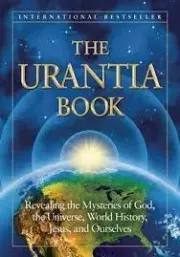Urantia Foundation - The Gospel of Jesus 1-2- Youth-Travels
Название: | The Gospel of Jesus 1-2- Youth-Travels | |
Автор: | Urantia Foundation | |
Жанр: | Старинная литература | |
Изадано в серии: | неизвестно | |
Издательство: | неизвестно | |
Год издания: | - | |
ISBN: | неизвестно | |
Отзывы: | Комментировать | |
Рейтинг: | ||
Поделись книгой с друзьями! Помощь сайту: донат на оплату сервера | ||
Краткое содержание книги "The Gospel of Jesus 1-2- Youth-Travels"
Urantia.org
The Gospel of Jesus-1
From Papers 120-129 from The Urantia Book
The Gospel of Jesus-2
From Papers 130-134 from The Urantia Book
Читаем онлайн "The Gospel of Jesus 1-2- Youth-Travels". Главная страница.
- 1
- 2
- 3
- . . .
- последняя (30) »
https://www.urantia.org/
The Gospel of Jesus
according to The Urantia Book
Childhood-Youth- From Papers 120-129
123:3.4 (1359.5) Before Jesus was six years of age, in the early summer of 1 b.c., Zacharias and Elizabeth and their son John came to visit the Nazareth family. Jesus and John had a happy time during this, their first visit within their memories. Although the visitors could remain only a few days, the parents talked over many things, including the future plans for their sons. While they were thus engaged, the lads played with blocks in the sand on top of the house and in many other ways enjoyed themselves in true boyish fashion.
123:3.6 (1360.1) During this year Joseph and Mary had trouble with Jesus about his prayers. He insisted on talking to his heavenly Father much as he would talk to Joseph, his earthly father. This departure from the more solemn and reverent modes of communication with Deity was a bit disconcerting to his parents, especially to his mother, but there was no persuading him to change; he would say his prayers just as he had been taught, after which he insisted on having “just a little talk with my Father in heaven.”
123:5.11 (1363.4) When entering school at seven years (at this time the Jews had just inaugurated a compulsory education law), it was customary for the pupils to choose their “birthday text,” a sort of golden rule to guide them throughout their studies, one upon which they often expatiated at their graduation when thirteen years old. The text which Jesus chose was from the Prophet Isaiah: “The spirit of the Lord God is upon me, for the Lord has anointed me; he has sent me to bring good news to the meek, to bind up the brokenhearted, to proclaim liberty to the captives, and to set the spiritual prisoners free.”
123:6.8 (1365.3) In February, Nahor, one of the teachers in a Jerusalem academy of the rabbis, came to Nazareth to observe Jesus, having been on a similar mission to Zacharias’s home near Jerusalem. He came to Nazareth at the instigation of John’s father. While at first he was somewhat shocked by Jesus’ frankness and unconventional manner of relating himself to things religious, he attributed it to the remoteness of Galilee from the centers of Hebrew learning and culture and advised Joseph and Mary to allow him to take Jesus back with him to Jerusalem, where he could have the advantages of education and training at the center of Jewish culture. Mary was half persuaded to consent; she was convinced her eldest son was to become the Messiah, the Jewish deliverer; Joseph hesitated; he was equally persuaded that Jesus was to grow up to become a man of destiny, but what that destiny would prove to be he was profoundly uncertain. But he never really doubted that his son was to fulfill some great mission on earth. The more he thought about Nahor’s advice, the more he questioned the wisdom of the proposed sojourn in Jerusalem.
123:6.9 (1365.4) Because of this difference of opinion between Joseph and Mary, Nahor requested permission to lay the whole matter before Jesus. Jesus listened attentively, talked with Joseph, Mary, and a neighbor, Jacob the stone mason, whose son was his favorite playmate, and then, two days later, reported that since there was such a difference of opinion among his parents and advisers, and since he did not feel competent to assume the responsibility for such a decision, not feeling strongly one way or the other, in view of the whole situation, he had finally decided to “talk with my Father who is in heaven”; and while he was not perfectly sure about the answer, he rather felt he should remain at home “with my father and mother,” adding, “they who love me so much should be able to do more for me and guide me more safely than strangers who can only view my body and observe my mind but can hardly truly know me.” They all marveled, and Nahor went his way, back to Jerusalem. And it was many years before the subject of Jesus’ going away from home again came up for consideration.
124:3.8 (1371.1) The only time Jesus ever saw his father angry with him was that night in their room at the inn when, in the course of their discussions, the boy so far forgot the trends of Jewish thought as to suggest that they go back home and work for the building of an amphitheater at Nazareth. When Joseph heard his first-born son express such un-Jewish sentiments, he forgot his usual calm demeanor and, seizing Jesus by the shoulder, angrily exclaimed, “My son, never again let me hear you give utterance to such an evil thought as long as you live.” Jesus was startled by his father’s display of emotion; he had never before been made to feel the personal sting of his father’s indignation and was astonished and shocked beyond expression. He only replied, “Very well, my father, it shall be so.” And never again did the boy even in the slightest manner allude to the games and other athletic activities of the Greeks as long as his father lived.
125:0.1 (1377.1) NO INCIDENT in all Jesus’ eventful earth career was more engaging, more humanly thrilling, than this, his first remembered visit to Jerusalem. He was especially stimulated by the experience of attending the temple discussions by himself, and it long stood out in his memory as the great event of his later childhood and early youth. This was his first opportunity to enjoy a few days of independent living, the exhilaration of going and coming without restraint and restrictions. This brief period of undirected living, during the week following the Passover, was the first complete freedom from responsibility he had ever enjoyed. And it was many years subsequent to this before he again had a like period of freedom from all sense of responsibility, even for a short time.
125:0.6 (1378.1) Though many of the temple rituals very touchingly impressed his sense of the beautiful and the symbolic, he was always disappointed by the explanation of the real meanings of these ceremonies which his parents would offer in answer to his many searching inquiries. Jesus simply would not accept explanations of worship and religious devotion which involved belief in the wrath of God or the anger of the Almighty. In further discussion of these questions, after the conclusion of the temple visit, when his father became mildly insistent that he acknowledge acceptance of the orthodox Jewish beliefs, Jesus turned suddenly upon his parents and, looking appealingly into the eyes of his father, said: “My father, it cannot be true—the Father in heaven cannot so regard his erring children on earth. The heavenly Father cannot love his children less than you love me. And I well know, no matter what unwise thing I might do, you would never pour out wrath upon me nor vent anger against me. If you, my earthly father, possess such human reflections of the Divine, how much more must the heavenly Father be filled with goodness and overflowing with mercy.
--">- 1
- 2
- 3
- . . .
- последняя (30) »
Книги схожие с «The Gospel of Jesus 1-2- Youth-Travels» по жанру, серии, автору или названию:
 |
| Urantia Foundation - Urantia book 120-196 Jesus Жанр: Старинная литература Год издания: 2022 |
| Urantia Foundation - The Gospel of Jesus-3 Жанр: Старинная литература Год издания: 101 |
Другие книги автора «Urantia Foundation»:
 |
| Urantia Foundation - Книга Урантии 135-145- Иисус и апостолы Жанр: Эзотерика, мистицизм, оккультизм Год издания: 2020 |
 |
| Urantia Foundation - Книга Урантии 162-178- Иисус в Иерусалиме Жанр: Эзотерика, мистицизм, оккультизм Год издания: 2020 |
| Urantia Foundation - The Gospel of Jesus-3 Жанр: Старинная литература Год издания: 101 |
| Urantia Foundation - Вера Иисуса Жанр: Эзотерика, мистицизм, оккультизм Год издания: 2023 |


